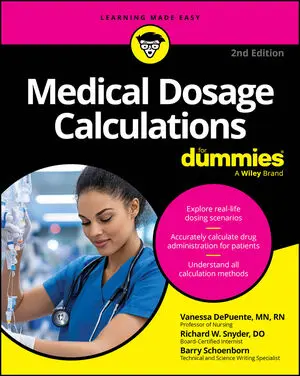This builtin is not currently supported: Animation
- Book & Article Categories

- Collections

- Custom Solutions
 Main Menu
Main MenuBook & Article Categories
 Main Menu
Main MenuBook & Article Categories
Richard Snyder
Rich Snyder, DO, is board certified in both internal medicine and nephrology. He teaches, lectures, and works with PA students, medical students, and medical residents.
Articles & Books From Richard Snyder
An accurate and easy-to-read resource for students in medical dosage calculation classes Medical Dosage Calculations For Dummies, 2nd Edition is an accurate guide to dosage calculation that tracks to standard course curricula. It's an easy-to-follow supplementary resource for students of nursing, pharmacology, paramedic programs and beyond, walking you through ratio-proportion, formula, and dimensional analyses for a wide variety of medication types.
Cheat Sheet / Updated 02-27-2024
The first step to dealing with high blood pressure is understanding your blood pressure measurement — those over and under numbers. When you know what your blood pressure is, you need to know what to do next. The good news is, you may be able to prevent high blood pressure or reduce your blood pressure by making some lifestyle changes.
Article / Updated 06-20-2023
A lot of pathology and Physician Assistant Exam questions concern the small and large intestines. Here you see conditions such as irritable bowel syndrome (IBS), ischemic bowel, inflammatory bowel disease (IBD), celiac disease, and diverticulitis.
Irritable bowel syndrome (IBS)
Irritable bowel syndrome (IBS) is a diagnosis of exclusion after other conditions have been ruled out.
Cheat Sheet / Updated 04-13-2022
When you're preparing to take the PANCE or PANRE, you may feel like you have to know an endless amount of information. How will you ever remember all the details of so many diseases and conditions? Here, you can review some useful mnemonics that will not only help your recall as you prepare for your physician assistant exam but also improve your clinical acumen.
Cheat Sheet / Updated 03-10-2022
Treating adrenal fatigue includes improving nutrition, replacing key nutrients, supplementing with antioxidants, reducing stress, and beginning a controlled exercise program. Before you can treat the condition, though, you need to recognize the symptoms that suggest you have adrenal fatigue.Recognizing the symptoms of adrenal fatigueIt’s hard to recognize the symptoms of adrenal fatigue for what they are.
Cheat Sheet / Updated 01-20-2022
No matter what initials you have after your name (RN, CNA, PA, and so on), you can bet you’ll see math on a daily basis if you’re going into (or are already in) a career in the medical field.Grasping some medical math basics — such as how to break down medical dosage problems into steps and use conversion factors — can simplify everyday situations all health care professionals face.
Article / Updated 06-16-2016
Rheumatoid arthritis (RA) is a debilitating inflammatory arthritis that can cause adrenal fatigue and typically occurs in middle-aged individuals, but it can occur in people as young as their 20s and 30s. This deforming type of arthritis needs to be actively treated because, when full blown, it causes erosion of the joints.
Article / Updated 05-13-2016
A common scenario you deal with clinically and for the Physician Assistant Exam (PANCE) is inadvertently finding a lung lesion on a chest radiograph. You’re looking for something, and bam! There it is. What do you do about it? You assess the lesion on the radiograph:
Check the other lung findings to make sure that you’re just dealing with a pulmonary nodule.
Article / Updated 03-26-2016
The two big medical conditions that can affect the ovaries are ovarian cysts and ovarian cancer. These will be covered on the Physician Assistant Exam. Ovarian cysts can cause abdominal and pelvic discomfort in women, and ovarian cancer is a cause of increased morbidity and mortality in older women. You don’t want to miss these conditions.
Article / Updated 03-26-2016
Several hip-related conditions make regular appearances on the Physician Assistant Exam (PANCE). You should be able to answer questions and know the basics regarding avascular necrosis, hip fractures, hip dislocation, and the slipped capital epiphysis.
Avascular necrosis (AVN)
When a person has a lack of blood supply to the head of the femur over a period of time, avascular necrosis (AVN) can result.




